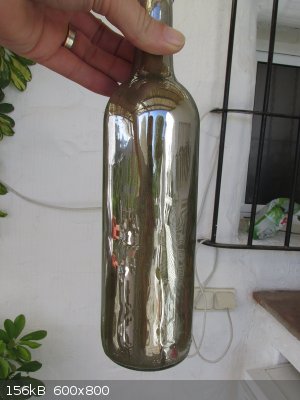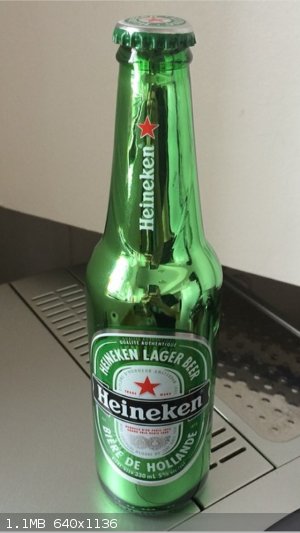| Pages:
1
2 |
Pumukli
National Hazard
   
Posts: 705
Registered: 2-3-2014
Location: EU
Member Is Offline
Mood: No Mood
|
|
Aga, if you have "Ag crud to reprocess" then the chemicals seem to be working. It excludes them from the possible sources of error.
The Ag particles should not be arranged as a "crud" but a thin layer attached to the glass surface, which step is obviously not working.
After emptying the wine from the bottle I would rinse the bottle with a few tens of ml-s water (tap water would suffice), then let the excess water
drip off (bottle upside down) for a few mins, then "rinse" the bottle with 10-20 ml-s concentrated nitric acid. Slowly spinning the bottle around in
order to cover all the once wine covered surface with the acid. I think it would oxidize any remaining organic wine components if they were attached
to the glass, leaving a fairly pure surface behind.
After the acid, rinse the bottle with pure water and apply the Ag solution.
When I tried this silvering long ago it worked even when I used regular tap water and sugar from my grandma's kitchen cabinet, although I can't
remember how I hydrolized the sucrose.
|
|
|
aga
Forum Drunkard
    
Posts: 7030
Registered: 25-3-2014
Member Is Offline
|
|
Strange that i get the same (failed) result with different processes, which is why i suspect my reagents, particularly the ammonium nitrate in the
last attempt.
The ambient temperature is still up at around 34 C here, so maybe that is having a detrimental effect.
For the last attempt i washed the bottle with gravel to try to scratch the inside, rinsed, washed with ferric chloride, rinsed copiously, then failed
again.
The bottle WILL get silvered. It has no choice.
Annoying as it is, discovering why it has not worked will be interesting.
|
|
|
Pumukli
National Hazard
   
Posts: 705
Registered: 2-3-2014
Location: EU
Member Is Offline
Mood: No Mood
|
|
Btw, "Ag crud" i.e. tiny Ag particles might form when the reaction is too quick and the Ag has no time to spread over the glass surface evenly but
forms miniature clumps instead, don't you think?
What if you tried with diluted reagents? Or pre-chilled reagents?
|
|
|
aga
Forum Drunkard
    
Posts: 7030
Registered: 25-3-2014
Member Is Offline
|
|
Good suggestion.
I will try to bring the reaction temperature down to a more 'normal' 20 C.
|
|
|
aga
Forum Drunkard
    
Posts: 7030
Registered: 25-3-2014
Member Is Offline
|
|
Working procedure :-
Wash & de-label an empty 70cl wine bottle.
Empty it in the normal way the night before.
Do not empty it immediately before using 
Rinse for 2 minutes with Nitric Acid (i used 56%)
Rinse twice with DIW.
Add 2.0g Fructose (from supermarket) and 40ml DIW to bottle. Swirl to dissolve the fructose.
Dissolve 5.1g Ammonium Nitrate in 20ml DIW.
Dissolve 1.7g Silver Nitrate in 20ml DIW
Mix these two solutions (called Tollen's Solution apparently).
Dissolve 4.0g Sodium Hydroxide in 40ml DIW
Add the Tollen's solution to the bottle.
Cork & shake for a few seconds.
Add the NaOH solution to the bottle.
Cork and shake for approx 10 minutes (or all eternity) until the silvering appears.

The result is far from perfect, however i'm happy to have finally achieved a reasonable result.
Dilute the waste liquid in a huge volume of water to prevent the formation/detonation of explosives.
[Edited on 19-9-2015 by aga]
|
|
|
Mailinmypocket
International Hazard
    
Posts: 1351
Registered: 12-5-2011
Member Is Offline
Mood: No Mood
|
|
Very nice!! If you can manage to empty a coloured glass bottle the result can be even more spectacular 

Note to self: Tare the damned flask.
|
|
|
aga
Forum Drunkard
    
Posts: 7030
Registered: 25-3-2014
Member Is Offline
|
|
I feel a Collection about to start ...
|
|
|
| Pages:
1
2 |